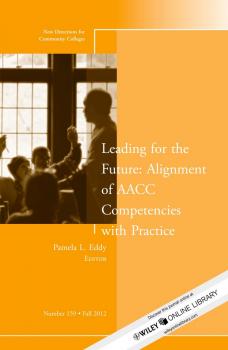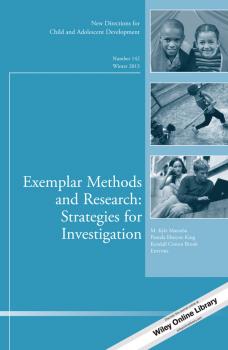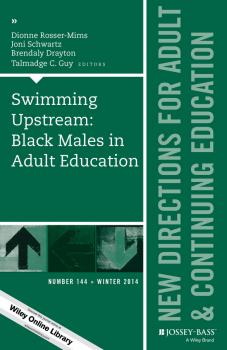Прочая образовательная литература
Различные книги в жанре Прочая образовательная литератураAdvancing the Regional Role of Two-Year Colleges. New Directions for Community Colleges, Number 157
In the midst of a challenging economic recovery, the nation’s policy makers and education leaders are seeking new and potentially more effective strategies to align personal and public educational investments with job creation, increased levels of employment, small business development, and entrepreneurial activity. Reaching the 2020 national college completion goal will require powerful and fully implemented innovations in two-year colleges, particularly in states and regions where economic difficulties are more deeply entrenched. Grounded in the Midwest context, this special issue examines several promising policies and innovations that re-envision the role of two-year colleges in developing regional rather than local solutions to the emerging economic and educational challenges. This is the 157th volume of this Jossey-Bass quarterly report series. Essential to the professional libraries of presidents, vice presidents, deans, and other leaders in today's open-door institutions, New Directions for Community Colleges provides expert guidance in meeting the challenges of their distinctive and expanding educational mission.
The Future of the Urban Community College: Shaping the Pathways to a Mutiracial Democracy. New Directions for Community College, Number 162
Urban community colleges–and the cities they serve–are undergoing rapid, multidimensional changes in response to new conditions and demands. The challenge for all community colleges, regardless of size or location, is to reinvent themselves so they can better meet the particular needs of their respective communities. This national higher-education mandate is vital to democracy itself, especially given the multiracial nature of metropolitan areas, where challenges and opportunities have always been most pronounced. This volume looks at how urban colleges are vigorously exploring new strategies for sustainability and success. Some of the most prominent practitioners examine every major aspect of the change-engagement process, including the role of governing boards, workforce development, community partnerships, and redesign of outdated business and finance models. This is the 162nd volume of this Jossey-Bass higher education quarterly report series, an essential guide for presidents, vice presidents, deans, and other leaders in today's open-door institutions, this quarterly provides expert guidance in meeting the challenges of their distinctive and expanding educational mission.
Leading for the Future: Alignment of AACC Competencies with Practice. New Directions for Community College, Number 159
The AACC competencies were initially developed to help provide guidance in developing community college leaders because of predictions of a leadership crisis in the two-year college sector. Since their creation, the competencies have been used to direct topics in leadership development programs and to guide future leaders about what skills are critical to master. Yet scant research exists on the use of the competencies in practice or on analysis of the competencies within the changing higher education climate. This issue provides a review of the research on the competencies in the field and posits several strategies for the future use of the competencies and potential changes to the competencies. This is the 159th volume of this Jossey-Bass quarterly report series. Essential to the professional libraries of presidents, vice presidents, deans, and other leaders in today's open-door institutions, New Directions for Community Colleges provides expert guidance in meeting the challenges of their distinctive and expanding educational mission.
Exemplar Methods and Research: Strategies for Investigation. New Directions for Child and Adolescent Development, Number 142
This issue: Defines and describes exemplar research methods Provides the case for their importance in revealing aspects of human functioning and its development, which are often neglected within traditional, mainstream psychology and allied disciplines Gives a glimpse into the growing depth and breadth of exemplar research within and beyond the moral domain Delivers insight into some of the complex contextual issues that emerge when studying human phenomena from this methodological perspective Provides critical commentary to help the reader determine the full value and limits of this research approach. This is the 142nd volume in this series. Its mission is to provide scientific and scholarly presentations on cutting edge issues and concepts in child and adolescent development. Each volume focuses on a specific new direction or research topic and is edited by experts in that field.
Frameworks and Ethics for Research with Immigrants. New Directions for Child and Adolescent Development, Number 141
Over the last 3 decades, there has been a rapid growth of diverse immigrant-origin populations in the United States and other postindustrial nations. This volume provides guidance in navigating the complexities of conducting research with immigrant-origin children, adolescents, and their families. It considers culturally and contextually embedded methodologies with a focus on ethical considerations in studying immigrant origin populations. Topics addressed include: Culturally and contextually embedded methodological approaches Undocumented status vulnerability Research logistics to provide protections to youth and their families as well as negotiating institutional review boards The role of researchers in shaping research Incorporation of a social and cultural lenses in the analysis and interpretation of studies Policy implications of presenting findings with this population. This is the 141st volume in this series. Its mission is to provide scientific and scholarly presentations on cutting edge issues and concepts in child and adolescent development. Each volume focuses on a specific new direction or research topic and is edited by experts on that topic.
Identity Around the World. New Directions for Child and Adolescent Development, Number 138
Examine the structure and context of identity development in a number of different countries: Belgium, the Netherlands, Germany, Sweden, Italy, China, and Japan. While some identity development proceeds in much the same way across national contexts, this issue suggests that there are important nuances in the ways in which identity unfolds in each country. Macrocultural forces, such as permissiveness in Sweden, collective guilt in Germany, and filial piety in China, direct the identity development process in important ways. Expectations regarding obligations and ties to family also direct the identity development process differently in many of the countries included in this volume—such as extended co-residence with parents in Italy, lifelong obligations to follow parents' wishes in China, and democratic independence in Sweden. The various countries are compared and contrasted against the United States, where much of the early identity research was conducted. The volume also reviews specific identity challenges facing immigrant and ethnic-minority individuals in countries that receive large numbers of immigrants—Germany, Sweden, Belgium, the Netherlands, and Italy—and suggests many future directions for identity research in various parts of the world. This is the 138th volume in this series. Its mission is to provide scientific and scholarly presentations on cutting edge issues and concepts in child and adolescent development. Each volume focuses on a specific new direction or research topic and is edited by experts on that topic.
Applications of Dialogical Self Theory. New Directions for Child and Adolescent Development, Number 137
In an increasingly interconnected world, a dialogical self is not only possible but even necessary. People are closer together than ever, yet they are confronted with apparent and sometimes even insurmountable differences. While there is a need of increased dialogue between individuals, groups, and cultures, it is equally important to develop of dialogical potentials within the self of the individual person. Elaborating on these concerns, the authors present and discuss a Dialogical Self Theory based on the assumption that the self functions as a society of mind. The self is not simply participating in a “surrounding” society, but functions itself as a mini-society, which is, at the same time, part of the society at large. The authors: Present the theory in detail Explore the developmental origins of the dialogical self Elaborate on the identity development of adolescents growing up in multicultural societies Discuss a striking example of a social movement in India, where individual and collective voices merge in a nationwide protest. This is the 137th volume in this series. Its mission is to provide scientific and scholarly presentations on cutting edge issues and concepts in child and adolescent development. Each volume focuses on a specific new direction or research topic and is edited by experts on that topic.
Thriving in Childhood and Adolescence: The Role of Self Regulation Processes. New Directions for Child and Adolescent Development, Number 133
Opening with a discussion on the need to integrate self-regulation processes and to create a life-span oriented framework of these processes, this volume explores several perspectives in the current scholarship. Chapter contributors examine theoretical concepts including Vygotsky/Luria Insights in the Development of Executive Functions Self-Regulation and Academic Achievement in Elementary School Children Influences of Children?s and Adolescents? Action-Control Processes on School Achievement, Peer Relationships, and Coping with Challenging Life Events Intentional Self-Regulation, Ecological Assets, and Thriving in Adolescence: A Developmental Systems Model and a Life-Span, Relational, Public Health Model of Self- Regulation: Impact on Individual and Community Health The volume concludes with New Directions for Child and Adolescent Development series editor-in-chief Reed W. Larson discussing the challenges reported by youth working on arts, technology, and social justice projects in organized programs and how they learn to address them. This is the 133nd volume of the Jossey-Bass quarterly report series New Directions for Child and Adolescent Development. The mission of this series is to provide scientific and scholarly presentations on cutting edge issues and concepts in the field of child and adolescent development. Each volume focuses on a specific new direction or research topic, and is edited by an expert or experts on that topic.
Swimming Upstream: Black Males in Adult Education. New Directions for Adult and Continuing Education, Number 144
Here is an introduction to salient topics and issues affecting Black males as they engage in adult basic education programs, pursue employment, and obtain higher education. The chapters include academic research as well as program descriptions and personal narratives with a concern for the “lived experiences” and the voices of the men. While not exhaustive, this volumne does hope to challenge commonly held stereotypes, interactions, and policies. It is designed to raise questions about the unique experiences of this specific population and to explore the sociocultural dynamics that impact their education. This is the 144th volume of the Jossey Bass series New Directions for Adult and Continuing Education. Noted for its depth of coverage, it explores issues of common interest to instructors, administrators, counselors, and policymakers in a broad range of education settings, such as colleges and universities, extension programs, businesses, libraries, and museums.
Learning Transfer in Adult Education. New Directions for Adult and Continuing Education, Number 137
Learning transfer is the use of skills and knowledge acquired in one situation or setting in a different environment. It is, fundamentally, the point of education. By consciously building it into our curricula, syllabi, and practice, we can greatly enhance the likelihood that students will integrate their learning and their lives. This issue examines learning transfer across the breadth of adult education. The authors approach the question practically, looking at techniques such as experiential or problem-based learning and the use of classroom technology as well as the perspectives of brain research, the effects of race and culture, and the context and complications of personal change. Each chapter offers practitioners a thoughtful outlook that will help them plan for and implement learning transfer in their particular area of focus. This is 137th volume of the Jossey-Bass quarterly report series New Directions for Adult and Continuing Education. Noted for its depth of coverage, it explores issues of common interest to instructors, administrators, counselors, and policymakers in a broad range of adult and continuing education settings, such as colleges and universities, extension programs, businesses, libraries, and museums.









